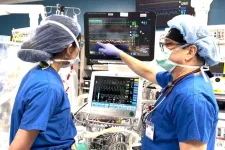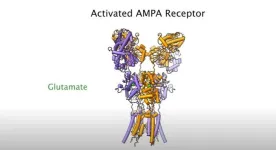(Press-News.org) General anesthesia makes it possible for millions of patients each year to undergo lifesaving surgeries while unconscious and free of pain. But the 176-year-old medical staple uses powerful drugs that have stoked fears of adverse effects on the brain — particularly if used in high doses.
New findings published June 10 in the Journal of the American Medical Association (JAMA), however, support an earlier study that indicates that anesthesia is no more hazardous for the brain at higher doses than at lower doses, according to the researchers.
The new study reports results of a multicenter clinical trial of more than 1,000 older patients who underwent cardiac surgery at four hospitals in Canada. Researchers at these hospitals, in partnership with colleagues at Washington University School of Medicine in St. Louis, found that the amount of anesthesia used during surgery did not affect the risk of postoperative delirium — a state that may contribute to long-term cognitive decline.
“Concern that general anesthesia harms the brain and causes both early and lasting postoperative cognitive disorders is a major reason that older adults avoid or delay life-enhancing procedures,” said Michael S. Avidan, MBBCh, the Dr. Seymour and Rose T. Brown Professor of Anesthesiology and head of the Department of Anesthesiology at Washington University. “Our new study contributes to other compelling evidence that higher doses of general anesthesia are not toxic to the brain. Dispelling the misleading and pervasive message that general anesthesia causes cognitive disorders will have major public health implications by helping older adults make wise choices regarding essential surgeries, which will promote and sustain healthier lives.”
The dose of administered anesthesia historically has been a carefully calculated balance between too little and too much. Administering an inadequate amount puts patients at risk of experiencing intraoperative awareness. Despite advances in anesthesia care, about 1 in 1,000 people still experience unintended waking during surgery without being able to move or indicate their pain or distress. This can lead to suffering and lifelong emotional trauma.
“The good news is that the distressing complication of intraoperative awareness can be more reliably prevented,” said Avidan, the study’s senior author. “Anesthesia clinicians can now confidently administer a sufficient dose of general anesthesia, providing a margin of safety for unconsciousness, without being concerned that this will put their patients’ brains at risk. The practice of general anesthesia should change based on mounting reassuring evidence.”
Previous smaller studies have suggested that too much anesthesia could be to blame for postoperative delirium, a neurological problem involving confusion, altered attention, paranoia, memory loss, hallucinations and delusions, among other symptoms. A common postoperative complication affecting about 25% of older patients after major surgeries, delirium can be distressing to patients and family members. It is typically temporary but has been linked to longer intensive care and hospital stays, other medical complications, persistent cognitive decline and higher risk of death.
To study the impact of minimizing anesthesia on postoperative delirium, Avidan and colleagues previously conducted a similar clinical study in more than 1,200 older surgical patients at Barnes-Jewish Hospital in St. Louis. The researchers used an electroencephalogram (EEG) to monitor electrical activity in the brains of patients during major surgery and adjusted anesthesia levels to prevent brain activity suppression, considered a sign of excessive anesthesia levels. They found that minimizing anesthesia administration did not prevent postoperative delirium.
To expand upon the results of their single-hospital clinical trial, Avidan collaborated with Alain Deschamps, MD, PhD, a professor of anesthesiology at Universitè de Montreal in Montreal, and a team of Canadian clinical researchers, to conduct the multicenter trial involving patients at four hospitals in Canada — in Montreal, Kingston, Winnipeg and Toronto.
This randomized clinical trial enrolled 1,140 patients undergoing cardiac surgery, high-risk procedures with a high rate of postoperative complications. Roughly half of the patients had their anesthesia adjusted based on electrical activity in the brain, and the other group of patients received the usual care without EEG monitoring. The former group was exposed to almost 20% less anesthesia than the latter group and also had 66% less time with suppressed electrical brain activity, but in both groups, 18% of the patients experienced delirium in the first five days after surgery. Additionally, the length of hospital stays, the incidence of medical complications and the risk of death up to one year postoperatively were no different between patients in the two study groups. However, almost 60% more patients in the group that received less anesthesia had undesirable movements while their surgeons were operating, which could have negatively affected the surgeries.
“The thinking has been that deep general anesthesia excessively suppresses electrical brain activity and causes postoperative delirium,” Avidan said. “Taken together, our two clinical trials, including almost 2,400 high-risk older surgical patients at five hospitals in the United States and Canada, dispel the concern that higher general anesthetic dosing incurs a neurotoxic cost. Delirium is likely to be caused by factors other than general anesthesia, such as the pain and inflammation associated with surgery. Future research should explore other avenues to prevent postoperative delirium. But we can now confidently reassure our patients that they can request and expect to be oblivious, immobile and pain-free during surgical procedures, without worrying about general anesthesia damaging their brains."
END
Multicenter clinical study supports safety of deep general anesthesia
Minimizing anesthesia during surgery for older adults does not prevent post-op delirium
2024-06-10
ELSE PRESS RELEASES FROM THIS DATE:
Cancer incidence trends in successive social generations in the US
2024-06-10
About The Study: In this model-based cohort analysis of incident invasive cancer in the general population, decreases in lung and cervical cancers in Generation X may be offset by gains at other sites. Generation X may be experiencing larger per-capita increases in the incidence of leading cancers than any prior generation born in 1908 through 1964. On current trajectories, cancer incidence could remain high for decades.
Corresponding Author: To contact the corresponding author, Philip S. Rosenberg, Ph.D., email rosenbep@mail.nih.gov.
To access the embargoed study: Visit ...
Global prevalence of overweight and obesity in children and adolescents
2024-06-10
About The Study: This study’s findings indicated 1 of 5 children or adolescents experienced excess weight and that rates of excess weight varied by regional income and Human Development Index. Excess weight among children and adolescents was associated with a mix of inherent, behavioral, environmental, and sociocultural influences that need the attention and committed intervention of primary care professionals, clinicians, health authorities, and the general public.
Corresponding Author: To ...
Severe pediatric neurological manifestations with SARS-CoV-2 or MIS-C hospitalization and new morbidity
2024-06-10
About The Study: The results of this study suggest that children and adolescents with acute SARS-CoV-2 or multisystem inflammatory syndrome in children (MIS-C) and severe neurological manifestations may be at high risk for long-term impairment and may benefit from screening and early intervention to assist recovery.
Corresponding Author: To contact the corresponding author, Ericka L. Fink, M.D., M.S., email finkel@ccm.upmc.edu.
To access the embargoed study: Visit our For The Media website at this link https://media.jamanetwork.com/
(doi:10.1001/jamanetworkopen.2024.14122)
Editor’s ...
Elephants have names for each other like people do, new study shows
2024-06-10
Colorado State University scientists have called elephants by their names, and the elephants called back.
Wild African elephants address each other with name-like calls, a rare ability among nonhuman animals, according to a new study published in Nature Ecology and Evolution.
Researchers from CSU, Save the Elephants and ElephantVoices used machine learning to confirm that elephant calls contained a name-like component identifying the intended recipient, a behavior they suspected based on observation. When the researchers played back recorded calls, elephants responded affirmatively ...
In a significant first, researchers detect water frost on solar system’s tallest volcanoes
2024-06-10
PROVIDENCE, R.I. [Brown University] — An international team of planetary scientists has detected patches of water frost sitting atop the Tharsis volcanoes on Mars, which are not only the tallest volcanic mountains on the Red Planet but in the entire solar system.
The discovery marks the first time frost has been spotted near the planet’s equator, challenging existing perceptions of the planet’s climate dynamics, according to the team’s new study in Nature Geoscience.
“We thought it was improbable for frost to form around Mars’ equator, as the mix ...
Super-chilled brain cell molecules reveal how epilepsy drug works
2024-06-10
FOR IMMEDIATE RELEASE
By super cooling a molecule on the surface of brain cells down to about minus 180 degrees Celsius — nearly twice as cold as the coldest places in Antarctica — scientists at Johns Hopkins Medicine say they have determined how a widely-used epilepsy drug works to dampen the excitability of brain cells and help to control, although not cure, seizures.
The research, published June 4 in Nature Structural & Molecular Biology, identifies critical connections between activity of the epilepsy drug ...
Benefits of failure are overrated
2024-06-10
The platitude that failure leads to success may be both inaccurate and damaging to society, according to research published by the American Psychological Association.
Researchers conducted 11 experiments with more than 1,800 participants across many domains and compared national statistics to the participants’ responses. In one experiment, participants vastly overestimated the percentage of prospective nurses, lawyers and teachers who pass licensing exams after previously failing them.
“People expect success to follow failure much more often than it actually does,” said lead researcher Lauren Eskreis-Winkler, PhD, an assistant ...
NUTRITION 2024 showcases groundbreaking research on what we eat and why it matters
2024-06-10
Don’t miss your chance to be among the first to hear breaking news in food and nutrition science at NUTRITION 2024. The annual flagship meeting of the American Society for Nutrition will be held June 29–July 2 at McCormick Place in Chicago.
Reporters and bloggers are invited to explore the meeting schedule and register for a complimentary press pass to attend.
The meeting will feature stimulating discussions, exciting research announcements and updates from groups shaping the nutrition and health policies that affect us all. Highlights include:
Diet and exercise performance – As the ...
Icahn School of Medicine at Mount Sinai awarded $21 million NIH grant to advance understanding of aging-related hormone
2024-06-10
New York, NY [June 10, 2024]—Researchers at the Icahn School of Medicine at Mount Sinai have been awarded a $21 million grant from the National Institute on Aging (NIA) of the National Institutes of Health (NIH), to further advance understanding of an aging-related hormone known as follicle-stimulating hormone (FSH), including its potential role in obesity, osteoporosis, and Alzheimer’s disease. The work could lead to the development of new treatments for these and other conditions involving aging.
This is a collaborative ...
RNA splicing’s spotters
2024-06-10
Bodybuilders and cellular mechanisms agree generating protein is a heavy lift. To complete the task, cells rely on complexes called spliceosomes. These molecular machines snip extra bits out of our genes’ RNA copies and piece together precise instructions for protein-building. When the splicing process goes awry, it can result in diseases like cancer or spinal muscular atrophy. Cold Spring Harbor Laboratory (CSHL) Professor Adrian Krainer helped develop the first FDA-approved treatment for this devastating genetic disorder. Now, his team has discovered that two important regulator proteins work together ...
LAST 30 PRESS RELEASES:
Fecal transplants from older mice significantly improve ovarian function and fertility in younger mice
Delight for diastereomer production: A novel strategy for organic chemistry
Permafrost is key to carbon storage. That makes northern wildfires even more dangerous
Hairdressers could be a secret weapon in tackling climate change, new research finds
Genetic risk for mental illness is far less disorder-specific than clinicians have assumed, massive Swedish study reveals
A therapeutic target that would curb the spread of coronaviruses has been identified
Modern twist on wildfire management methods found also to have a bonus feature that protects water supplies
AI enables defect-aware prediction of metal 3D-printed part quality
Miniscule fossil discovery reveals fresh clues into the evolution of the earliest-known relative of all primates
World Water Day 2026: Applied Microbiology International to hold Gender Equality and Water webinar
The unprecedented transformation in energy: The Third Energy Revolution toward carbon neutrality
Building on the far side: AI analysis suggests sturdier foundation for future lunar bases
Far-field superresolution imaging via k-space superoscillation
10 Years, 70% shift: Wastewater upgrades quietly transform river microbiomes
Why does chronic back pain make everyday sounds feel harsher? Brain imaging study points to a treatable cause
Video messaging effectiveness depends on quality of streaming experience, research shows
Introducing the “bloom” cycle, or why plants are not stupid
The Lancet Oncology: Breast cancer remains the most common cancer among women worldwide, with annual cases expected to reach over 3.5 million by 2050
Improve education and transitional support for autistic people to prevent death by suicide, say experts
GLP-1 drugs like Ozempic could cut risk of major heart complications after heart attack, study finds
Study finds Earth may have twice as many vertebrate species as previously thought
NYU Langone orthopedic surgeons present latest clinical findings and research at AAOS 2026
New journal highlights how artificial intelligence can help solve global environmental crises
Study identifies three diverging global AI pathways shaping the future of technology and governance
Machine learning advances non targeted detection of environmental pollutants
ACP advises all adults 75 or older get a protein subunit RSV vaccine
New study finds earliest evidence of big land predators hunting plant-eaters
Newer groundwater associated with higher risk of Parkinson’s disease
New study identifies growth hormone receptor as possible target to improve lung cancer treatment
Routine helps children adjust to school, but harsh parenting may undo benefits
[Press-News.org] Multicenter clinical study supports safety of deep general anesthesiaMinimizing anesthesia during surgery for older adults does not prevent post-op delirium






